by M. C. Jennings | Mar 21, 2024 | Academics, COBA Events, COBA Faculty, College Decisions, Current Students, Faith Infusion, Special Speakers, Uncategorized
written by special contributor, Lance Fleming
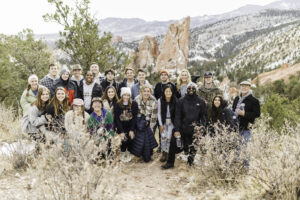 For 26 years, the ACU College of Business Administration has hosted a Leadership Summit in the mountains of Colorado intended to re-energize the mind, body, and soul. Each Summit takes on a life of its own, providing answers to the questions the attendees bring with them each year.
For 26 years, the ACU College of Business Administration has hosted a Leadership Summit in the mountains of Colorado intended to re-energize the mind, body, and soul. Each Summit takes on a life of its own, providing answers to the questions the attendees bring with them each year.
The recently completed 2024 version of Leadership Summit wasn’t different. This year’s version might have been the most diverse session of any of the 26 that have occurred.
Established in 1998 in the College of Business Administration, Summit is a one-week, 3-hour course hosted in picturesque Colorado. The course blends academic rigor with an environment ripe for deep, personal, and lasting encounters with Jesus. Dr. Rick Lytle, Tim Johnston (‘80), and Mike Winegeart (’86) dreamed of an experience that would take students out of the regular classroom and inspire them to think of their future work as missional. The first Leadership Summit was held in 1998, and the trio would go on to be involved in various aspects of the class over the next few decades.
Leadership Summit is open to all majors and classifications on campus – it’s not just for business students. Because this year’s cohort consisted of so many non-business majors, Dr. Dennis Marquardt, Associate Professor of Management and Director of the Lytle Center for Faith and Leadership, said Summit 2024 started a bit differently than other sessions.
“This was one of our most diverse groups along the lines of classification and major, so the first few days of Summit were really about getting to know each other,” he said. “It takes time to trust one another and be vulnerable with each other, which is an important aspect of the growth process at Summit. We also hosted more speakers than ever and from a wide range of industry backgrounds, so the week was packed, especially the first two days. By Wednesday, I noticed the group came together and opened up around some deep spiritual topics.”
The base curriculum for this year’s Summit centered around two books: Christian Reflections on the Leadership Challenge by Jim Kouzes and Barry Posner and The Freedom of Self-forgetfulness by Tim Keller. Each day is assigned one of the five leadership practices from the Leadership Challenge – Model the Way, Inspire a Shared Vision, Challenge the Process, Enable Others to Act, and Encourage the Heart – but every speaker is encouraged to share their spiritual journey in whatever way the Spirit moves.
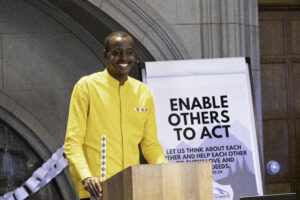
Serge Gasore (’09), co-founder of Rwanda Children
This year, Marquardt said, notable themes emerged across topics such as forgiveness from Serge Gasore (’09) and Tonya Carruthers, pride and humility from Tim Goeglein and Tony Roach (’01), and vision and role-modeling from Elise Mitchell (’83) and April Anthony (’89). Each speaker, he said, is encouraged to be transparent and vulnerable, creating an environment for deep collective reflection and sharing with the students. When that happens, Jesus takes over, and theory and books fade into the background.
“It’s one thing to learn about theory and read textbooks on leadership, and there certainly is a place for that,” Marquardt said, “but true learning and growth happens in community and relationships. Summit is distinct because it pairs the best leadership teaching with the spirit and heart. The environment is ripe for true reflection on how we become the servants God calls us to be so that we might be people of influence known for bearing hope, peace, and love.”
Hayden Poorman – a senior from Tuscola graduating in May and triple-majoring in finance, accounting, and information systems – completed his second trip to Summit in January. Like last year, Poorman said he left Colorado Springs with a definite direction for his life.
“Last year, I felt incredibly empowered to make changes in my life and impact those around me,” Poorman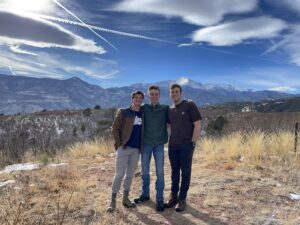 said. “For instance, after coming down from the mountain, my friend Matthew Trow (’24) and I initiated a Real Estate & Banking club on campus to assist students in navigating the industry. This year, I went to Summit seeking Godly wisdom and guidance and a time to wrestle with my inner struggles.
said. “For instance, after coming down from the mountain, my friend Matthew Trow (’24) and I initiated a Real Estate & Banking club on campus to assist students in navigating the industry. This year, I went to Summit seeking Godly wisdom and guidance and a time to wrestle with my inner struggles.
“Instead of feeling energized and engaging in constant hiking and exploration (though I did still hike), I found solitude in the mountain landscape and sought God,” he said. “ I firmly believe that God worked on me in the stillness of the mountains. I left the mountain prepared to confront my final semester of college and effectively navigate the valley I was traversing.”
Poorman said one reason he felt ready to take on the final weeks of his collegiate experience was the nightly conversation with his roommate on the trip, Mason Graham (’25).
“We discussed the day’s topics and delved into how life was unfolding for each of us, offering support and encouragement,” Poorman said. “Mason played a pivotal role in helping me articulate my thoughts and was instrumental in navigating my journey through faith and suffering.”
Allie Harper, a junior Bible and ministry major from Carrollton, was deeply affected by the connections with students and speakers during the six days spent on the mountain.
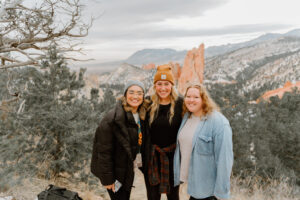 “I think what makes Summit so impactful for people is that you get to retreat from everyday routine and spend time with like-minded people,” Harper said. “The connections and friendships I made at Summit are special because of our unity in Christ. Those connections have given me people to rely on, whether needing strong leaders to help with a ministry event or business and finance advice.
“I think what makes Summit so impactful for people is that you get to retreat from everyday routine and spend time with like-minded people,” Harper said. “The connections and friendships I made at Summit are special because of our unity in Christ. Those connections have given me people to rely on, whether needing strong leaders to help with a ministry event or business and finance advice.
“Something I remembered during one of the morning sessions was the people in my life I love who don’t know Christ,” she said. “Needless to say, I was a teary mess but also felt loved and encouraged by those who sat with me and prayed for those people. It reminded me that sometimes we have to sit in grief, but the Lord always brings hope and joy.”
This year’s Summit was Harper’s first venture to the mountain castle, and she said she came away with a deeper appreciation of the skills needed to be effective in ministry.
“I wasn’t sure what exactly to expect at Summit, but the whole week, I was surprised by the connections to faith, scripture, and community,” she said. “I saw what good Christian leadership looks like through the speakers, professors, and fellow students. It reminded me of the importance of leadership skills and not just a knowledge of scripture. I realized that to be effective as a minister, I need both. I would encourage those who aren’t pursuing a career in ministry but in the business world that God has called and equipped them because the world needs more Christ-like teachers, financial advisors, doctors, and salespeople. I left the week grateful because I had been equipped with scripture and the leadership skills to make me a better minister.”
And those moments – of reflection, self-awareness, and enlightenment – help make the moving parts that go into planning a week-long, out-of-state conference worth it for Marquardt.
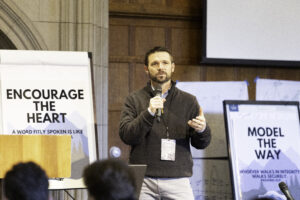
Dr. Dennis Marquardt
“There was just a moment this year when the Summit program began, and I looked at all of us worshipping together and about to embark on this special experience for the next week, and it broke me,” Marquardt said. “God is good. And He is gracious to allow us such a transformational experience.”
And that experience is what the first 26 Leadership Summits have given each participant and will continue to be the focus of in the future.
“God does amazing things, and He chooses to do those things through His people,” Marquardt said. “When we surrender to Him, our lives become this grand Kingdom adventure (which is not always safe or easy), but it allows us to serve others in transformational ways. That service might be as a business leader, community member, or in a family, but we will all have the opportunity to step into it. We want Leadership Summit to create leaders who are servants first and run into the storms and fires of life to be bearers of hope, peace, and life.”
by M. C. Jennings | Nov 28, 2023 | Academics, Alumni Spotlight, COBA Faculty, College Decisions, Current Students, Economics, Faith Infusion, Social Entrepreneurship, Uncategorized
Written by special contributor Lance Fleming
Costa Rica, a small Central American country, is experiencing a significant increase in tourism. Travel officials in Costa Rica expect an unprecedented surge in tourists in 2023 and 2024. This country is famous for its national parks, rainforests, beaches, wildlife, and outdoor activities.
ACU students in the College of Business Administration have been traveling to Costa Rica since an initial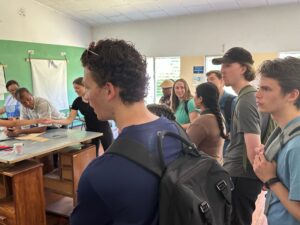 Central America Study Abroad trip with Dr. Mark and Dr. Laura Phillips in 2016. In 2018, they traveled to Turrialba, Costa Rica to visit CATIE, an agricultural university with a focus on economic development. In 2019, the first Social Enterprise Consulting class was offered and the partnership with CATIE began, focusing on economic development. But those students aren’t just in Costa Rica to observe. They are learning practical skills in research, marketing, and product creation from a class taught by Dr. Laura Phillips, Dr. Sarah Easter, Dr. Jennifer Golden, Dr. Mark Phillips, and Daniel Garcia. Currently, the class is working with local entrepreneurs to launch products made from materials donated by Southwest Airlines.
Central America Study Abroad trip with Dr. Mark and Dr. Laura Phillips in 2016. In 2018, they traveled to Turrialba, Costa Rica to visit CATIE, an agricultural university with a focus on economic development. In 2019, the first Social Enterprise Consulting class was offered and the partnership with CATIE began, focusing on economic development. But those students aren’t just in Costa Rica to observe. They are learning practical skills in research, marketing, and product creation from a class taught by Dr. Laura Phillips, Dr. Sarah Easter, Dr. Jennifer Golden, Dr. Mark Phillips, and Daniel Garcia. Currently, the class is working with local entrepreneurs to launch products made from materials donated by Southwest Airlines.
Dr. Mark Phillips and Garcia will teach the class next semester, and then Easter and Golden will teach a summer course. Students in each class will go over topics teaching them how to be a consultant, how to help without hurting, Costa Rican culture (both generally and in the business world), and some project-specific topics.
During Spring Break, the spring semester class will be in Costa Rica, and afterward, they will focus on completing their deliverable to the client for the rest of the semester. Dr. Laura Philips said the summer class will have a different format. It will include 5-6 weeks of online content on the same topics as in the spring. After that, students will spend nearly two weeks in Costa Rica to work on the project.
AACSB (the Association to Advance Collegiate Schools of Business) seeks to encourage all accredited schools to make a societal impact. As they state on their website, “AACSB’s vision of societal impact is that business schools contribute their specialized expertise to help mitigate some of society’s most pressing economic, social, human, and environmental problems.”
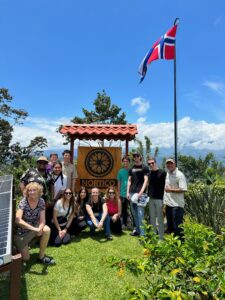 COBA was already seeking to make a broader societal impact through their programs. Now the Costa Rica activities are part of a broader COBA initiative. Dr. Laura Phillips said, “It’s exciting because AACSB is now asking us to do more of what we were already doing. The change isn’t to the consulting class. What’s different now is that we will have more activities (curricular, research, and engagement) focused on the same theme of Increasing Educational and Economic Opportunities for People in Marginalized Groups.”
COBA was already seeking to make a broader societal impact through their programs. Now the Costa Rica activities are part of a broader COBA initiative. Dr. Laura Phillips said, “It’s exciting because AACSB is now asking us to do more of what we were already doing. The change isn’t to the consulting class. What’s different now is that we will have more activities (curricular, research, and engagement) focused on the same theme of Increasing Educational and Economic Opportunities for People in Marginalized Groups.”
A five-person committee began meeting earlier this year to come up with a theme for the college’s work, Increasing Educational and Economic Opportunities for People in Marginalized Groups, and a tentative five-year plan.
“The plan includes curricular, research, and engagement objectives for our residential and online campuses,” Dr. Phillips said. “The Costa Rica class is one piece of this plan. We want the societal impact plan to provide opportunities for all interested faculty and staff to be involved, and that is part of the reason we are expanding the faculty who teach the consulting class. The plan also includes the development of additional partners for consulting projects. We are interested in developing a second international partner as well as cultivating a partnership closer to home.”
When Dr. Phillips first visited the CATIE campus with students in 2018, she connected with Dr. Eliecer Vargas, an economist at CATIE who specializes in economic development, which aligns well with the COBA students’ focus in Costa Rica.
Five years ago, students spent a few days exploring tourism startups by rural female entrepreneurs in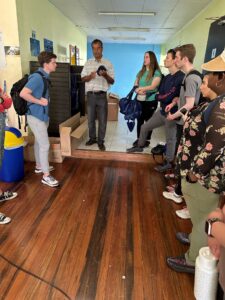 towns near Turrialba. After their trip, Dr. Phillips and Dr. Easter approached Vargas to discuss the idea of starting a consulting class and having the group of female entrepreneurs as their first client. Vargas agreed, and Dr. Phillips and Dr. Easter took their first group of consulting students to Costa Rica in the spring of 2019.
towns near Turrialba. After their trip, Dr. Phillips and Dr. Easter approached Vargas to discuss the idea of starting a consulting class and having the group of female entrepreneurs as their first client. Vargas agreed, and Dr. Phillips and Dr. Easter took their first group of consulting students to Costa Rica in the spring of 2019.
Southwest Airlines has served as the air provider for ACU’s program, transporting students and professors to and from Costa Rica, and in 2022, Southwest Airlines arranged a deal with CATIE to give the university seats from their refurbished planes.
The Turrialba region is now a major focus of Southwest’s investments. The company has set up a leatherworking shop on campus where local women and men can receive training and have access to leather and high-quality sewing machines with their support.
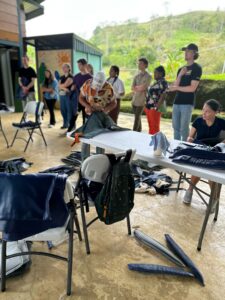 As part of Southwest Airlines’ “Repurpose with Purpose” program, each of the company’s fleet of airplanes is overhauled every four years, and as a part of that process, the seat leather is replaced. The leather pulled out of the planes is donated to nonprofit organizations for upcycling projects.
As part of Southwest Airlines’ “Repurpose with Purpose” program, each of the company’s fleet of airplanes is overhauled every four years, and as a part of that process, the seat leather is replaced. The leather pulled out of the planes is donated to nonprofit organizations for upcycling projects.
The idea is to create a business incubator to launch businesses as people graduate from the training program. Jobs are also being created in rural communities because CATIE receives intact seat covers that must be deconstructed before they are upcycled into new products.
And that’s where the ACU students enter the picture.
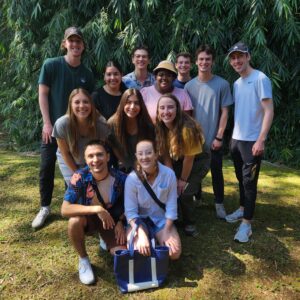 The students’ client is called Wearsos – the first business to come out of the leather project – and it was started by the husband-and-wife duo of Lynne Corvaglia and Chris Riquelme. Aside from upcycled bags, the company also plans to make other products like passport holders, wallets, luggage tags, and shoes.
The students’ client is called Wearsos – the first business to come out of the leather project – and it was started by the husband-and-wife duo of Lynne Corvaglia and Chris Riquelme. Aside from upcycled bags, the company also plans to make other products like passport holders, wallets, luggage tags, and shoes.
No two trips to Costa Rica have been alike, with the specifics of the project changing with every trip, usually at the request of the client. That means the specific business topics the students focus on vary.
“They always learn something from the business side of the project, although the bigger learning outcomes stem from the nature of cross-cultural consulting,” Dr. Phillips said. “The students have to stretch their problem-solving and critical-thinking skills and they have to do that in a group setting and not just on their own. Their flexibility and adaptability are put to the test every day we are there.
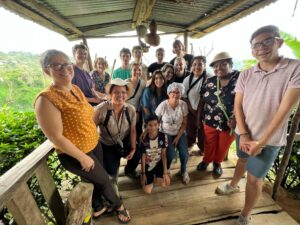 “They learn that other cultures may have different objectives and priorities for their business than what they usually see in the U.S., and they learn that the American measures of success are not the only measures,” she said. “They also learn that to provide useful recommendations for the client, they have to truly understand the client’s objectives and tailor their business solutions to meet the needs and the desires of the clients.”
“They learn that other cultures may have different objectives and priorities for their business than what they usually see in the U.S., and they learn that the American measures of success are not the only measures,” she said. “They also learn that to provide useful recommendations for the client, they have to truly understand the client’s objectives and tailor their business solutions to meet the needs and the desires of the clients.”
From the business skill side, Dr. Phillips said, the students have worked on market assessments and provided feedback based on the personas of different target customers. One class conducted focus groups to provide market research on potential products. Classes have researched logistics to help the client as they prepare to ship goods from Costa Rica to the US and Canada.
Other students created a comprehensive marketing plan (Instagram and Facebook posts, email campaigns,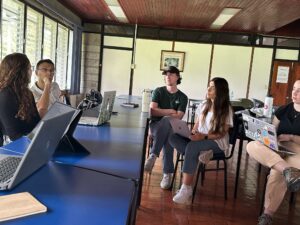 etc.) to help a client roll out a Kickstarter campaign. Students listened to entrepreneurs talk about current and future product ideas as well as where and how they intend to sell and then provided a comprehensive list of questions to each entrepreneur to help them think through and further develop their business plans.
etc.) to help a client roll out a Kickstarter campaign. Students listened to entrepreneurs talk about current and future product ideas as well as where and how they intend to sell and then provided a comprehensive list of questions to each entrepreneur to help them think through and further develop their business plans.
Dr. Phillips said proposed expansion plans for the program that have been discussed are for the Costa Rica consulting class to be offered twice each year: once in the spring and once in the summer with a variety of faculty involved in teaching the class. Dr. Phillips also said she would like to involve COBA alumni on the trip to provide their expertise in the project’s area of focus.
“That could be social media marketing, logistics, building basic business plans, finding funding sources, or rural development,” she said. “I also hope to continue our partnership with Southwest Airlines. It has been valuable to be working with their Repurpose with Purpose group because we can truly partner to support these clients.”
To learn more about the College of Business at ACU, click here.
by M. C. Jennings | Oct 19, 2023 | Academics, Careers In..., COBA Faculty, COBA Staff, College Decisions, Computer Science, Current Students, Faith Infusion, School of Information Technology and Computing, Student Spotlights
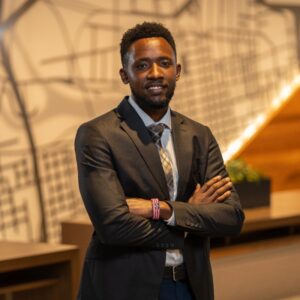 written by special contributor Lance Fleming
written by special contributor Lance Fleming
Fabrice Mpozenzi spent his summer internship working for JP Morgan Chase in Wilmington, Delaware, where he had the opportunity to get in on the ground floor of working on the front end and back end of web applications and other projects meant to further his understanding of the business.
The junior computer science major from Rwanda also worked on a business with a team of interns, which was eventually presented to senior executives for implementation. Mpozenzi’s internship fueled his desire to work as a software engineer after he graduates from ACU.
We recently caught up with Mpozenzi to get his insights on his summer internship and how ACU prepared him to work with JP Morgan Chase.
Q: What did you do in your internship?
Mpozenzi: “I had a chance to work on several different projects. I worked on a web application’s front and back end and presented it to a team of engineers, including my manager. I also had an opportunity to collaborate with other interns to work on a business plan project that we presented to senior executives.”
Q: What was your favorite part of the internship?
Mpozenzi: “What I loved most about my internship was the opportunity to shadow other teams to see the projects they were working on and learn from them. I also loved networking with different people at the company.”
Q: What are the most significant lessons you learned in your internship?
Mpozenzi: “The internship taught me two things: learning is a journey that never ends because there’s always going to be something new to learn, and one must stay hungry and motivated to learn new skills. I also learned that asking questions, especially in the workplace, is an art that unlocks knowledge and fosters a deeper understanding.”
Q: How do you see this experience aiding you in the future?
Mpozenzi: “It’s given me a roadmap to an industry that I would like to contribute to in the future, and I made connections with people from diverse backgrounds that I believe are going to be helpful in my future endeavors.”
Q: What are your plans after graduation?
Mpozenzi: “I plan to work with a Fintech company as a software engineer.”
Q: Do you have any tips for future interns or students looking for internships?
Mpozenzi: “I would tell students looking for internships to stay proactive and seek support from the professional development team. Also, stay informed about your industry, and once you secure an internship, make the most of the experience by learning and networking.”
Q: How has your time at ACU prepared you for this internship, employment, or graduate school after graduation?
Mpozenzi: “The academic coursework at ACU has equipped me with a solid foundation of knowledge and problem-solving skills relevant to my field. ACU’s professional development services, including resume workshops and interview coaching, have also helped me refine my professional presentation. These resources have prepared me for this internship and laid the groundwork for my post-graduation plans.”
Q: What’s been your most memorable experience as a business or technology student at ACU?
Mpozenzi: “My favorite thing about being a technology student at ACU is the supportive faculty and the vibrant student community that has created an environment where I can collaborate and engage in meaningful discussions with peers. ACU’s commitment to fostering a strong community has enriched my academic experience.”
by M. C. Jennings | May 26, 2023 | Academics, Athletics, COBA Faculty, COBA Staff, Current Students, Faith Infusion, Management, Student Spotlights, Student Spotlights
Written by special contributor Lance Fleming
Each day, students across the ACU campus display the university’s mission to educate students for Christian service and leadership throughout the world through their actions and acts of service on the campus. Each year, students like those are nominated by their academic departments. From those nominations, 50 scholars are selected by the ACU Faculty Senate to receive the University Scholars Award for their graduating class.
Among those 50 scholars who demonstrated outstanding scholarship by maintaining a grade point average (GPA) of 3.5 or higher, earning 90 hours towards their degree, and continuing the pursuit of knowledge in their research field, seven are students from the College of Business Administration. The COBA students who received this year’s University Scholars Award are Kathryn Crawford, Gracie Isham, Matthew Roberson, Will Harris, Diego Lozano Welsh, Ben Blackmon, and Garrett Powell.
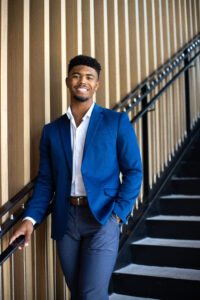 We have been highlighting each of those seven individuals over the last few weeks, including this profile of Will Harris. A native of Houston, Texas, and a business management major, Will carries a 3.78 GPA while competing on the ACU track and field team. Aside from his work on the track, Will is already a licensed realtor, having earned his real estate license two years ago. Will has been selling properties for two years, and his post-graduation plan is to continue selling real estate with the goal of becoming one of the top-producing tenant representatives in Houston.
We have been highlighting each of those seven individuals over the last few weeks, including this profile of Will Harris. A native of Houston, Texas, and a business management major, Will carries a 3.78 GPA while competing on the ACU track and field team. Aside from his work on the track, Will is already a licensed realtor, having earned his real estate license two years ago. Will has been selling properties for two years, and his post-graduation plan is to continue selling real estate with the goal of becoming one of the top-producing tenant representatives in Houston.
Will also wants to open a center for financial literacy, entrepreneurship, and professional development in an underrepresented area of Houston. Will competes in the long jump, triple jump, and 100 meters as part of ACU’s tradition-rich track and field program and is also a member of Lynay and the president of the College Entrepreneurs Organizations (CEO). He’s also a part of the Student-Athlete Advisory Committee, Nu Kappa Psi, and is a DEI mentor.
Will recently answered a few questions about his time at ACU and in COBA, covering everything from his most influential class to the most unique thing he’s been a part of while at ACU:
Q: What is the most important thing you’ve learned about yourself at ACU?
Harris: “The most important thing I have learned at ACU is how to step into a leadership role even when you feel unprepared. The only way to grow is to become uncomfortable for a period of time.”
Q: What professor or class has impacted you most and why?
Harris: “Dr. Dennis Marquardt and Dr. Matt Deeg had the most significant impact on me because they have taken so much time outside the classroom to invest in me as a young man of God. Both men set the standard for integrity in and out of the classroom, and while their classes taught me a lot about business, the value I gained from being in their presence was more rewarding.”
Q: What has been your experience in COBA?
Harris: “My favorite COBA experience was, by far, Leadership Summit 2023. The Lord did something to my heart on that mountaintop, and I honestly was not the same person when I returned to school. I learned to trust the Lord and surrender my life to Him in a way I didn’t know was possible.”
Q: Of all the things you’ve experienced at ACU, what do you believe will have the most impact on your life?
Harris: “ACU Track and Field gave me a family I will never lose. For four years, I learned what it meant to fight hard towards a shared goal with a team! The way the coaches and team mentored me and grew me as a Christian man is the one thing that impacted me the most during my time at ACU.”
by M. C. Jennings | May 19, 2023 | Academics, Alumni Spotlight, COBA Faculty, COBA Staff, College Decisions, Current Students, Faith Infusion, Human Resource Management, Management, Outcomes, Student Spotlights, Student Spotlights
Written by special contributor Lance Fleming
Each day, students across the ACU campus display the university’s mission to educate students for Christian service and leadership throughout the world through their actions and acts of service on the campus. Each year, students like those are nominated by their academic departments. From those nominations, 50 scholars are selected by the ACU Faculty Senate to receive the University Scholars Award for their graduating class.
Among those 50 scholars who demonstrated outstanding scholarship by maintaining a grade point average (GPA) of 3.5 or higher, earning 90 hours towards their degree, and continuing the pursuit of knowledge in their research field, seven are students from the College of Business Administration. The COBA students who received this year’s University Scholars Award are Kathryn Crawford, Gracie Isham, Matthew Roberson, Will Harris, Diego Lozano Welsh, Ben Blackmon, and Garrett Powell.
We have been highlighting each of those seven individuals over the last few weeks, including this profile of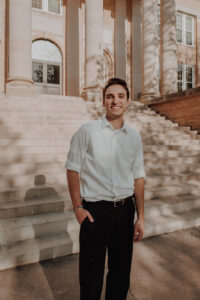 Diego Lozano Welsh. A native of Coppell, Texas, Diego recently graduated with a 3.87 GPA as a business management major. In June, he will begin work as a Talent Acquisition Specialist for Sinacola, a construction company in Frisco, Texas.
Diego Lozano Welsh. A native of Coppell, Texas, Diego recently graduated with a 3.87 GPA as a business management major. In June, he will begin work as a Talent Acquisition Specialist for Sinacola, a construction company in Frisco, Texas.
As a student, Diego – a member of Frater Sodalis – was instrumental in reviving the Lighthouse Catholic Student Organization, which was hit hard by COVID in 2020 and almost disappeared. But with the help of sponsors and parishes in Abilene, Diego led the effort to bring the organization back to campus. He was also part of Lynay, and as a freshman, he began doing volunteer work with “Palm House Kids,” a group that provides children from lower-income families a meal and a place to play and teaches them about Jesus.
Diego recently answered a few questions about his time at ACU and in COBA, covering everything from his most influential class to the most unique thing he’s been a part of while at ACU:
Q: What is the most important thing you’ve learned about yourself at ACU?
Welsh: “The most important thing I’ve learned about myself is that I have been equipped to spread the gospel. I learned how to involve my faith in everything that I do. This allows me to show my hope in Christ and bring that hope to others.”
Q: What professor or class has impacted you most and why?
Welsh: “Dr. Matt Deeg greatly impacted my development during college. I was lucky enough to have a class with him for three consecutive semesters. During those semesters, I changed my major and concentration a few times. He walked with me each time, having conversations to help lead me in the right direction. He was a fantastic teacher whom I learned a lot from professionally. However, the most significant impact he had in my life was personally, as a mentor and a friend.”
Q: What has been your experience in COBA?
Welsh: “I have loved every moment in COBA. I got to work as a COBA student ambassador during my senior year, giving tours to high school students and working in the offices for recruitment. That allowed me to have a different perspective on COBA. I saw the faculty and staff every day and experienced the culture in COBA. This was such a fantastic opportunity; it allowed me to build relationships with everyone working there and see them as real people: these relationships and all the experiences I had in COBA combined into a beautiful experience at ACU.”
Q: Of all the things you’ve experienced at ACU, what do you believe will have the most impact on your life?
Welsh: “The relationships I built will be the most impactful. The way that I learned to build relationships with mentors and the friendships I developed will shape how I live the rest of my life.”
by M. C. Jennings | May 9, 2023 | Academics, Accounting, Current Students, Faith Infusion, MAcc, Research, Student Spotlights, Uncategorized
Written by special contributor Lance Fleming
Each day, students across the ACU campus display the university’s mission to educate students for Christian service and leadership throughout the world through their actions and acts of service on the campus. Each year, students like those are nominated by their academic departments. From those nominations, 50 scholars are selected by the ACU Faculty Senate to receive the University Scholars Award for their graduating class.
Among those 50 scholars who demonstrated outstanding scholarship by maintaining a grade point average (GPA) of 3.5 or higher, earning 90 hours towards their degree, and continuing the pursuit of knowledge in their research field, seven are students from the College of Business Administration. The COBA students who received this year’s University Scholars Award are Kathryn Crawford, Gracie Isham, Matthew Roberson, Will Harris, Diego Lozano Welsh, Ben Blackmon, and Garrett Powell.
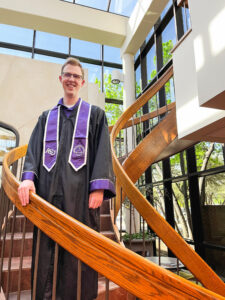 We will highlight each of the seven over the next month, including this profile of Matthew Roberson, a native of Weatherford who carries a 4.0 GPA and is graduating with a degree in accounting. After graduation, Matthew plans to complete his Master of Accountancy with ACU and continue his audit internship with Condley and Company.
We will highlight each of the seven over the next month, including this profile of Matthew Roberson, a native of Weatherford who carries a 4.0 GPA and is graduating with a degree in accounting. After graduation, Matthew plans to complete his Master of Accountancy with ACU and continue his audit internship with Condley and Company.
Matthew has served as Vice President of Fundraising for ACU’s chapter of the International Justice Mission and was also a member of the Alpha Chi National College Honor Society and the Beta Gamma Sigma Honor Society.
Matthew recently answered a few questions about his time at ACU and in COBA, covering everything from his most influential class to the most unique thing he’s been a part of while at ACU:
Q: What is the most important thing you’ve learned about yourself at ACU?
Roberson: “I’ve learned that I value relationships more than academic or work success. Investing time to know the people I am around provides me with the most fulfillment.”
Q: What professor or class has impacted you most and why?
Roberson: “This one is tough to answer. Each professor I have had at COBA has profoundly impacted my life, and I cannot honestly rank who has done so the most. However, the class that most influenced the trajectory of my life was Financial Accounting 210 with Dr. Clint Buck. Before taking that class, I struggled with finding purpose and fulfillment in my previous major. While Dr. Buck provided a logical foundation for accounting principles that I still rely on to this day, the most important thing he did was help me understand why and how accountants bring good into our communities. All I needed was the ‘why’ and the ‘what’ followed soon after.”
Q: What has been your experience in COBA?
Roberson: “My experience in COBA has been unparalleled. I transferred to ACU in the second half of my junior year, and I fully expected COBA to be like the other academic environments I had experienced. However, I was happily proved wrong. There is a familial atmosphere at COBA that I was hard-pressed to find elsewhere. The professors pushed me to be the best I could be, but I never once felt like I had to go it alone.”
Q: Of all the things you’ve experienced at ACU, what do you believe will have the most impact on your life?
Roberson: “The connections I have formed at ACU will impact my life the most.”
 For 26 years, the ACU College of Business Administration has hosted a Leadership Summit in the mountains of Colorado intended to re-energize the mind, body, and soul. Each Summit takes on a life of its own, providing answers to the questions the attendees bring with them each year.
For 26 years, the ACU College of Business Administration has hosted a Leadership Summit in the mountains of Colorado intended to re-energize the mind, body, and soul. Each Summit takes on a life of its own, providing answers to the questions the attendees bring with them each year.
 said. “For instance, after coming down from the mountain, my friend Matthew Trow (’24) and I initiated a Real Estate & Banking club on campus to assist students in navigating the industry. This year, I went to Summit seeking Godly wisdom and guidance and a time to wrestle with my inner struggles.
said. “For instance, after coming down from the mountain, my friend Matthew Trow (’24) and I initiated a Real Estate & Banking club on campus to assist students in navigating the industry. This year, I went to Summit seeking Godly wisdom and guidance and a time to wrestle with my inner struggles. “I think what makes Summit so impactful for people is that you get to retreat from everyday routine and spend time with like-minded people,” Harper said. “The connections and friendships I made at Summit are special because of our unity in Christ. Those connections have given me people to rely on, whether needing strong leaders to help with a ministry event or business and finance advice.
“I think what makes Summit so impactful for people is that you get to retreat from everyday routine and spend time with like-minded people,” Harper said. “The connections and friendships I made at Summit are special because of our unity in Christ. Those connections have given me people to rely on, whether needing strong leaders to help with a ministry event or business and finance advice. 
 Central America Study Abroad trip with Dr. Mark and Dr. Laura Phillips in 2016. In 2018, they traveled to Turrialba, Costa Rica to visit CATIE, an agricultural university with a focus on economic development. In 2019, the first Social Enterprise Consulting class was offered and the partnership with CATIE began, focusing on economic development. But those students aren’t just in Costa Rica to observe. They are learning practical skills in research, marketing, and product creation from a class taught by Dr. Laura Phillips, Dr. Sarah Easter, Dr. Jennifer Golden, Dr. Mark Phillips, and Daniel Garcia. Currently, the class is working with local entrepreneurs to launch products made from materials donated by Southwest Airlines.
Central America Study Abroad trip with Dr. Mark and Dr. Laura Phillips in 2016. In 2018, they traveled to Turrialba, Costa Rica to visit CATIE, an agricultural university with a focus on economic development. In 2019, the first Social Enterprise Consulting class was offered and the partnership with CATIE began, focusing on economic development. But those students aren’t just in Costa Rica to observe. They are learning practical skills in research, marketing, and product creation from a class taught by Dr. Laura Phillips, Dr. Sarah Easter, Dr. Jennifer Golden, Dr. Mark Phillips, and Daniel Garcia. Currently, the class is working with local entrepreneurs to launch products made from materials donated by Southwest Airlines.  COBA was already seeking to make a broader societal impact through their programs. Now the Costa Rica activities are part of a broader COBA initiative. Dr. Laura Phillips said, “It’s exciting because AACSB is now asking us to do more of what we were already doing. The change isn’t to the consulting class. What’s different now is that we will have more activities (curricular, research, and engagement) focused on the same theme of Increasing Educational and Economic Opportunities for People in Marginalized Groups.”
COBA was already seeking to make a broader societal impact through their programs. Now the Costa Rica activities are part of a broader COBA initiative. Dr. Laura Phillips said, “It’s exciting because AACSB is now asking us to do more of what we were already doing. The change isn’t to the consulting class. What’s different now is that we will have more activities (curricular, research, and engagement) focused on the same theme of Increasing Educational and Economic Opportunities for People in Marginalized Groups.” towns near Turrialba. After their trip, Dr. Phillips and Dr. Easter approached Vargas to discuss the idea of starting a consulting class and having the group of female entrepreneurs as their first client. Vargas agreed, and Dr. Phillips and Dr. Easter took their first group of consulting students to Costa Rica in the spring of 2019.
towns near Turrialba. After their trip, Dr. Phillips and Dr. Easter approached Vargas to discuss the idea of starting a consulting class and having the group of female entrepreneurs as their first client. Vargas agreed, and Dr. Phillips and Dr. Easter took their first group of consulting students to Costa Rica in the spring of 2019. As part of Southwest Airlines’ “Repurpose with Purpose” program, each of the company’s fleet of airplanes is overhauled every four years, and as a part of that process, the seat leather is replaced. The leather pulled out of the planes is donated to nonprofit organizations for upcycling projects.
As part of Southwest Airlines’ “Repurpose with Purpose” program, each of the company’s fleet of airplanes is overhauled every four years, and as a part of that process, the seat leather is replaced. The leather pulled out of the planes is donated to nonprofit organizations for upcycling projects. The students’ client is called Wearsos – the first business to come out of the leather project – and it was started by the husband-and-wife duo of Lynne Corvaglia and Chris Riquelme. Aside from upcycled bags, the company also plans to make other products like passport holders, wallets, luggage tags, and shoes.
The students’ client is called Wearsos – the first business to come out of the leather project – and it was started by the husband-and-wife duo of Lynne Corvaglia and Chris Riquelme. Aside from upcycled bags, the company also plans to make other products like passport holders, wallets, luggage tags, and shoes. “They learn that other cultures may have different objectives and priorities for their business than what they usually see in the U.S., and they learn that the American measures of success are not the only measures,” she said. “They also learn that to provide useful recommendations for the client, they have to truly understand the client’s objectives and tailor their business solutions to meet the needs and the desires of the clients.”
“They learn that other cultures may have different objectives and priorities for their business than what they usually see in the U.S., and they learn that the American measures of success are not the only measures,” she said. “They also learn that to provide useful recommendations for the client, they have to truly understand the client’s objectives and tailor their business solutions to meet the needs and the desires of the clients.” etc.) to help a client roll out a Kickstarter campaign. Students listened to entrepreneurs talk about current and future product ideas as well as where and how they intend to sell and then provided a comprehensive list of questions to each entrepreneur to help them think through and further develop their business plans.
etc.) to help a client roll out a Kickstarter campaign. Students listened to entrepreneurs talk about current and future product ideas as well as where and how they intend to sell and then provided a comprehensive list of questions to each entrepreneur to help them think through and further develop their business plans. written by special contributor Lance Fleming
written by special contributor Lance Fleming We have been highlighting each of those seven individuals over the last few weeks, including this profile of Will Harris. A native of Houston, Texas, and a business management major, Will carries a 3.78 GPA while competing on the ACU track and field team. Aside from his work on the track, Will is already a licensed realtor, having earned his real estate license two years ago. Will has been selling properties for two years, and his post-graduation plan is to continue selling real estate with the goal of becoming one of the top-producing tenant representatives in Houston.
We have been highlighting each of those seven individuals over the last few weeks, including this profile of Will Harris. A native of Houston, Texas, and a business management major, Will carries a 3.78 GPA while competing on the ACU track and field team. Aside from his work on the track, Will is already a licensed realtor, having earned his real estate license two years ago. Will has been selling properties for two years, and his post-graduation plan is to continue selling real estate with the goal of becoming one of the top-producing tenant representatives in Houston. Diego Lozano Welsh. A native of Coppell, Texas, Diego recently graduated with a 3.87 GPA as a business management major. In June, he will begin work as a Talent Acquisition Specialist for Sinacola, a construction company in Frisco, Texas.
Diego Lozano Welsh. A native of Coppell, Texas, Diego recently graduated with a 3.87 GPA as a business management major. In June, he will begin work as a Talent Acquisition Specialist for Sinacola, a construction company in Frisco, Texas. We will highlight each of the seven over the next month, including this profile of Matthew Roberson, a native of Weatherford who carries a 4.0 GPA and is graduating with a degree in accounting. After graduation, Matthew plans to complete his Master of Accountancy with ACU and continue his audit internship with Condley and Company.
We will highlight each of the seven over the next month, including this profile of Matthew Roberson, a native of Weatherford who carries a 4.0 GPA and is graduating with a degree in accounting. After graduation, Matthew plans to complete his Master of Accountancy with ACU and continue his audit internship with Condley and Company.